Table of Contents
For my next post, I am going to focus on how speed has affected the rankings and revenue growth of our top four web assets.
I’ve always studied our websites, what thought leaders are saying, what Google is recommending and what the general competition is doing in the different industries we target.
The more experience I gain over the years, the more I realize most digital marketers who rush business owners to speed up their websites are full of sh*t. You’ll hear crazy claims to speed up your website or you’ll lose visibility in search. This is simply not true. Not in our case at least.
I am not saying all the so-called experts are wrong. I am trying to get you to think independently of the hive.
Is the cost worth it? I am going to share what I’ve done for our agency and if it was worth the effort.
Here’s what we’ll go over:
- Where did we start from
- I’ll share independent project stats and speed information
- Go over rankings growth/declines
- What happened to our conversion numbers
- What did it cost to speed up our projects
- I’ll share how long it took to speed up each web asset
- I’ll also speak about what would happen if WordPress or our plugins update
- Our new protocol for developing new projects and pushing new changes
- Are our top competitors speeding up their websites
Where were we in terms of speed
We’ve always struggled with speed. Especially on our WordPress websites.
That being said, it doesn’t mean that we didn’t produce fast websites. It just means that we’re constantly working on speeding our websites due to the nature of WordPress.
The speed of our most profitable website:
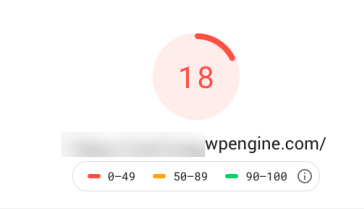

Our visibility for this project with these speed scores was 90%+ at the time (August 2020). We were consistently outranking huge competitors without any trouble.

Clearly, speed is not an issue with this project. While we were working on speed, at no time did our rankings drop.
The speed scores of our second most profitable web asset:
Our second most profitable website is an extension of our first most profitable business.
The goal of this website was to capture more real estate in Google with different products.
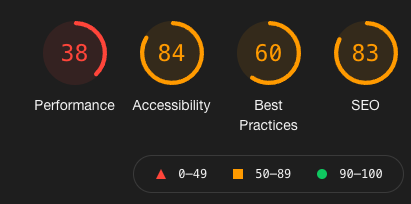

Our speed for this project has always been good so we’ve left it alone without changing anything.
The rankings for this website is not as good as our first website but it hovers over a 50%+ visibility range. It ranks for all of our primary keywords.
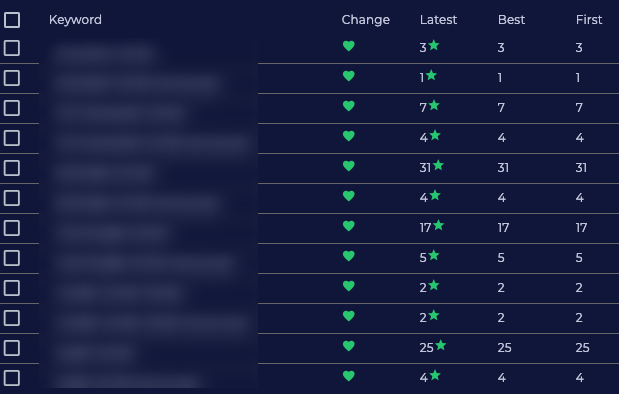
The speed score of our third most valuable web asset
This website has the biggest potential to take the first spot. For now, it sits at number three.
Like all the other projects, it currently does not have a good CLS rating:
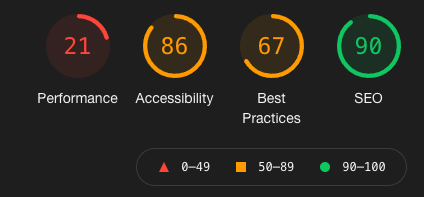
With GTmetrix, we seem to have very good scores on all of our pages:

We didn’t do much with this website and left it alone.
This project is national in the US so an average position number of 8.14 is pretty solid:

Speed score of our fourth most valuable web asset
The fourth website was the worst-performing web asset in terms of website speed.
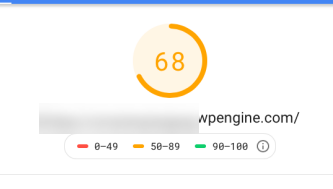
Our GtMetrix scores were even worse:

Of the four projects, project one and four has always been focal points. Projects two and three were left alone.
This project generates millions of dollars for our business so it was imperative to improve whatever we could.
Here is the rankings percentage during the month of August 2020, which is when we decided to improve our speed scores:
This is a local project so a visibility percentage of 19.8% is not good enough. The results after the optimization will surprise you for this project.
Keep in mind that our competitors for all projects are huge multi-billion dollar conglomerates.
Conversion stats before & after speed optimization
Everywhere I looked, all the high-level SEOs or marketing directors were preaching about how if we don’t optimize for speed, conversion numbers would not be as good as they should be.
Here are our new web speed scores for the first project:

Please understand that every single template was optimized. I am just sharing the scores from our homepage. Every single page now loads in less than 3 seconds.
Our Google numbers are pretty good too:
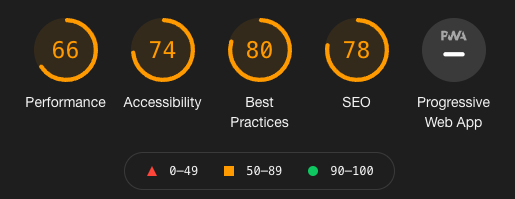
The mobile speed score is not as good as our desktop score, of course:
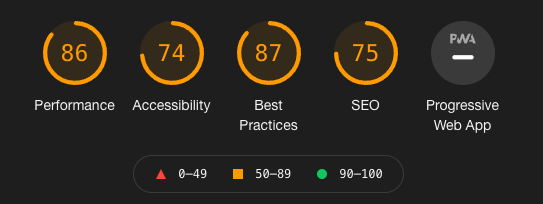
Well, let me share the proof of our conversion numbers.
In regards to project one, speed took 22.5 hours to complete. The task was completed on September 22nd.
Let’s compare our lead numbers:

Considering our website loads a lot faster, it looks like our conversion didn’t improve at all. In fact, it looks like our conversion numbers were lower.
Now, I am not saying the drop in conversion is because of speeding up the website.
There are many factors that can go into coming up with a conclusion like:
- What else was done on the website? Nothing in our case other than new pages and products.
- What was the market like at the time of optimization versus the time I am comparing my data?
Some might even say that our rankings might have dropped from September 9, 2021, to November 9, 2021, compared to the same period last year.
On the contrary, our rankings improved by a percentage point:
Note: You’re probably never going to see a website that ranks for almost all of its keywords in the top four positions. It’s rare and we’ve achieved it with project 1.
Current status of the fourth project
The fourth project has great speed numbers now (comparatively to where we started, at least). The speed task was completed on Aprile 8th, 2020.
Here’s how it’s performing on GTmetrix:

Here are our mobile and desktop speed numbers from Google:
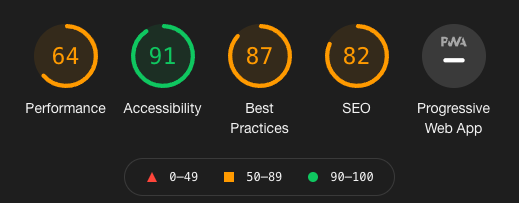
As always, your desktop score will always be better:
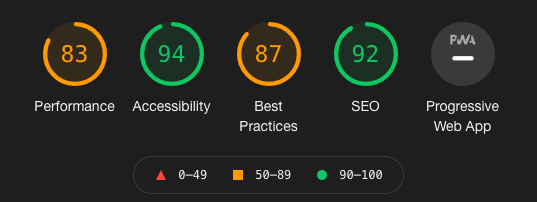
Let’s see what happened to our lead numbers:

Well, that doesn’t look too good. Our leads dropped by 16.7%. Again, we’ve done everything to improve this website and the drop in leads could be for many reasons knowing that the products on this website cost between $40k-$400k.
Our visibility scores for April 8, 2020 was 24%. It’s now sitting at 17%.
There is a reason for this. During 2020, we sold a lot of our inventory. Today, we only have 40% of what we had in 2020 because of the supply disruptions so I would take these numbers with a grain of salt.
If you think about it, our leads dropped by almost 17% and so did our rankings. Interesting since a lot of our products from 2020 is not available for the same period in 2021.
So did speed help us? I wouldn’t think so. Our data shows us that website speed did not really affect the conversion numbers of project four.
What did it cost to speed up our 2 websites?
In total, our devs spent 33.5 hours optimizing web assets one and four.


That’s less than $1000 for our agency. I would say the cost is not something to worry about in our case.
However, when you have 25+ web assets in need of speed optimization, your cost can easily hit $30K depending on the size of each project.
For now, we’re going to optimize the most profitable web assets and move our way down.
Note: The nature of our industry is a little different from others. Our audience is old school and has the patience to stick around if the website takes an extra second to load. This will change and we will ensure every single profitable web asset loads instantly in the near future.
Our new development protocol
In the past, I would give our developers a list to follow when launching a website.
Here’s a part of what I required from them:
- Make sure all the templates within WP load within three seconds
- Make sure you test every category/product page with Lighthouse (mobile/desktop)
- Do not rely on plugins to speed up a website
- Don’t go overboard with lazyload
- Ensure every image is optimized properly
- Ensure the website is set to index
- Do not change the URL hierarchy
Time and time again, the devs would fail my list and I would just get angrier with each launch. There was a point where I would say “I don’t trust devs” right to their faces.
That changed when we found our new senior dev. He took all the testing off my desk and created his own protocol through Git.
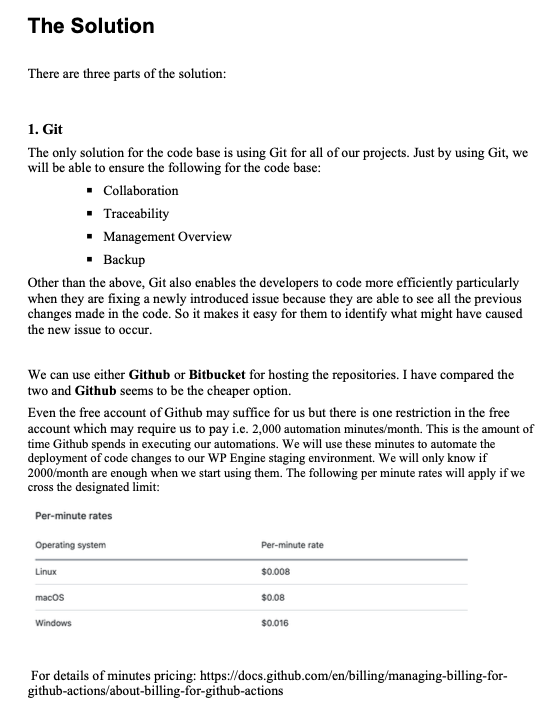
I understand this is outside of what we’re speaking about in terms of rankings, conversion and speed optimization. I just had to show everyone how efficient it is to get off the manual narrative and on to a Git environment.
A total game changer.
What about updating plugins or WordPress
Once again, this is where Git comes into play.
Our developer has designed a system where if any plugin will break our website if we update it, he’ll know through Git before going live.
We went from constant bugs with updates to almost no issues when updating plugins or WordPress.
The larger players in our industry
Okay, you might be thinking our whole industry has slow websites. Let’s take a look at how they’re doing.
Major competitor 1:
The first competitor is a multi-billion dollar company and all over the world. Traffic is clearly not an issue for these guys.
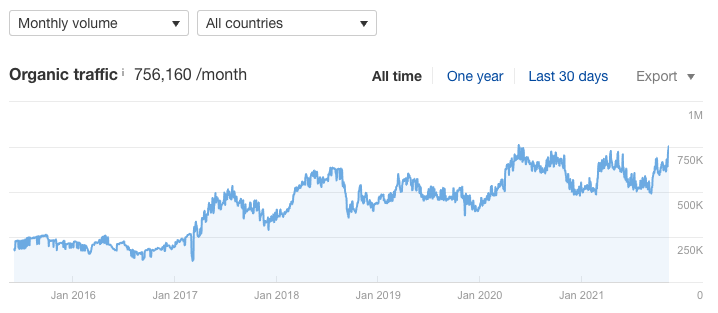
Let’s look at their homepage first.

Not looking good. Although, the homepage does load fast. It just needs a little work to improve.
What about their category and product pages?

The category page is instant. Almost no load-time.
Their product pages also load fast. With a little work, they can clearly get near perfect scores.

We beat these guys in the provinces and states they compete against us. We’re not really that much slower or faster.
Speed is obviously not the biggest ranking factor between us and competitor 1.
Major competitor 2:
The second competitor is the second biggest company next to competitor one. They are almost as big and all over world.
Let’s look at their organic traffic estimates:
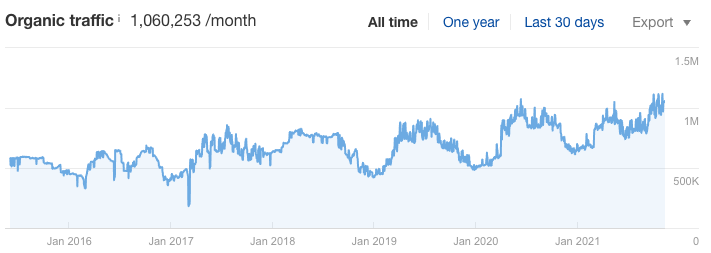
Massive company. Just massive.
Let’s look at the website speed of their homepage, category page(s) and product page(s).

Oof, someone dropped the ball here. Again, the website is not super slow but it needs help. For a multi-billion dollar company, they sure know how to slow things down.
Their category page is the same deal. Pretty bad scores:

Finally, let’s look at their product pages:

We clearly beat competitor two in terms of speed.
The rest of our competitors are too small to compare against. I know, it’s an interesting industry we’ve picked.
Please keep in mind that these two competitors are very large and authoritative so beating them is a huge badge of honor for us.
We all know that there are hundreds of factors that go into better rankings. If it’s backlinks, we lose big time. If it’s technical SEO, we’re much stronger since we’re smaller. If it’s content on our blog, we lose. If it’s speed, we beat one competitor but not the other.
The conclusion? I don’t think speed is a factor in us beating our competitors. Not yet at least. Yes, one competitor is slower but not by a crazy amount. They get millions of visits so clearly it’s an afterthought for their development team.
Conclusion
Should we obsess over website speed? I don’t think so.
Taking our website speed seriously and optimizing it would be more appropriate.
Most of us don’t have more than 20,000 visits/day and because of that, you have to manage your resources accordingly.
I would focus on improving user experience first and then jumping on website speed.
To see experts put website speed on a pedestal is eye-opening. What other SEO tactics are they generalizing without really understanding the subject?
Again, these individuals don’t know any better. You are the only person responsible here.
Now that you see the results of what I’ve shared, I would run a test in my own industry and determine if speed optimization is necessary.
Please don’t put words in my mouth by saying I don’t want you to optimize for speed. Any landing page loading for more than four seconds should be looked at closely. I am just trying to open your eyes to a counterpoint.
I hope I’ve given you all something to think about.
Until next time, catch you all my next post.

